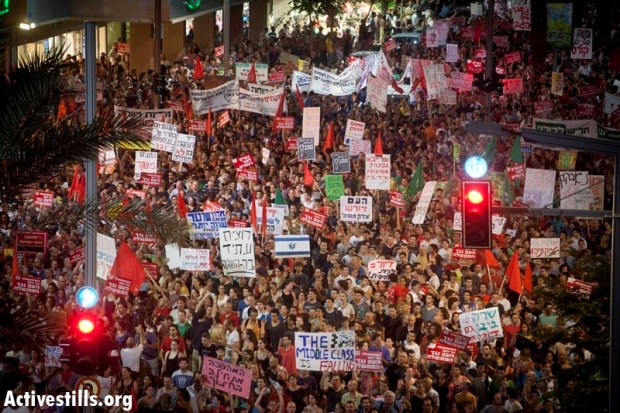Recently published polls regarding the social protest reveal potential for major political changes in Israel, though not necessarily immediate ones

The Tent Protest has been dominating the news cycle in Israel for two weeks, and now there are also a couple of interesting polls regarding its possible political impact.
While it would be unwise to try and predict what sort of effect these unprecedented demonstrations will have on Israeli politics, the polls do confirm some of the hunches we had in the last three weeks, and most notably, a potential for far-reaching changes in the political system in the years to come.
– The support for the protest crosses sectors and party lines. According to Channel 10’s poll conducted on Monday, 88 percent of Israelis support the protest. The middle class parties lead the way: 98 percent of Kadima voters (!), 95 percent of Labor’s and even 85 percent of Netanyahu’s Likud voters find the protest just. Even if these figures dropped in the last couple of days—which had some fractions and public disputes in the protest movement—they are still exceptionally high.
– The attempts to discredit the protest have mostly failed. Government spokesperson and rightwing organizations tried to tie the protest to left wing movements, claiming that it is a politically-motivated move aimed personally against PM Netanyahu. Still, 74 percent of the public think that the protest is a genuine one, and only 22 percent find it to be politically motivated.
– The hard right is the only group not identifying with the protest. Half of Shas’ voters and most of those voting for the settlers’ parties think the protest is politically motivated. Voters of those parties are more inclined to oppose the protest than any other group. I believe that these groups sense that the protest might challenge the dominant political arrangements in Israel – ones with benefit the settlers and the religious parties.
– The protesters reject the major opposition and the coalition parties alike. I wouldn’t take the headline of the Globes-Jerusalem Post’s poll—about a possible social party winning 20 seats in the coming elections—too seriously. There is a long time until the elections and it’s impossible to know which issues will dominate the campaign. Still, it’s very interesting to see where these 20 seats (roughly 16 percent of the votes) come from: 4-5 seats from Kadima, 2-3 seats from Likud, 2-3 seats from Labor, and some more votes from Meretz and undecided voters. The Arab parties and the extreme right are not hurt by the protest.
Those figures match the Channel 10 poll – it’s the middle class that supports the protest more than any other group, and it’s the parties on the center and left of the political map which voters are unhappy with. This is good news for those (like me) who think that Kadima and Labor cannot promote progressive agenda. It seems that many of those parties’ voters are giving up hope on them as well.
– The best option for the government is to negotiate with protesters and possibly try to co-opt them. According to the Jerusalem Post, 45 percent of the public thinks that the protesters should negotiate with the government to try to obtain their demands, 29 percent said the demonstrations should go on in their current format. If the government looks serious enough, it could cut the popular support for the demonstrations by two thirds.
To sum it up, all figures point to a unique phenomenon: the secular middle class – usually the backbone of society—is unsatisfied with the political and economical trends, and more important, with the entire political system (usually it’s the other way around – the more you move to the edges of the system, the less satisfied people there are). Under these circumstances, the potential for major political changes—though not necessarily immediate ones—is enormous.

